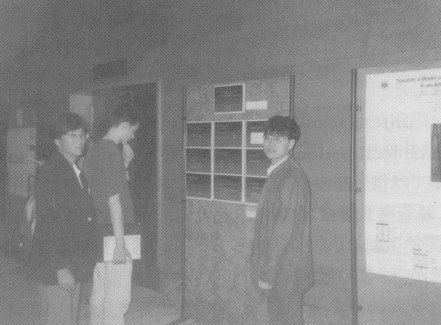
I went Spain to present my research at the European Conference on Artificial Life(ECAL), and to study research trends at research institutions in other countries in fields related to the RWC. This is a report on ECAL, where I gave a presentation, and other places.
Along with A-Life, ECAL is one of two major conferences in the research field of artificial life.
While University of Tokyo and Sony CSL were well represented, it was somewhat surprising that there were few presentations from Tsukuba University, ATR and Hokkaido University, known for researh on artificial life. This appears to be because they are aming for A-Life V, which will be held in Japan in May 1996.
At last year's A-Life IV, engineering (especially robotics) presentations were prevalent; at this year's EAL, there was much to be gained from presentations by researhers from varios fields, including physics, biology and economics. In a session on applications and common tools. I gae a presentation(poster) on the idea of parallelization of evolutionary computation; I believe we had a useful exchange of opinions with Dr. Tani, a Sony CSL researher, and others.

There were 143(all oral) presentations made at this conference, covering a variety of subjects, including learning algorithms, self-organization, cognitive science, computational models, applications to control systems, and hardware implementation. Of these 143, I was interested mainly in presentations on storing time series forecasting, chaos, and applications to robots. One of the interesting presentations to me was a paper of Professor Dracopoulos and others from the UK's Brunel University attempting to control non-linear problems and chaos dynamic with a hybrid system consisting of neural networks and genetic algorithms.
I discussed autonomous system models with Professor F.Sandoval, Dr. Joya and others from Malaga University.
On this trip I felt a special enthusiasm at ECAL, the same as at A-Life IV last year, where young researchers were often involved in highly-charged discussions. Researchers are concerned today that the artificial life boom might just be something temporary. However, seeing the enthusiasm at ECAL, I cannot help think that articial life might become one of the most useful research fields for opening up new technologies.